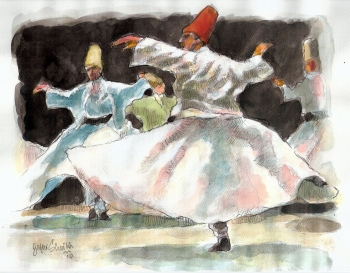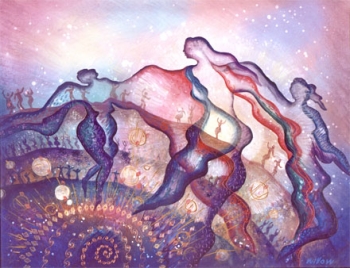Original Chinese text: Leung Po San
Translation and English editing: Raymond Lam
Leung Po Shan is a Cantonese author who has written various works about life and experiencing the best things the world has to offer.
14 May 2006
Our teacher, Faye, conducted a workshop for us this week. On Monday it was the sacred dance of George Ivanovitch Gudjieff (1877-1949), which I haven’t been able to follow since the last ten years. On this occasion there was plenty of time, and the workshop was conducted step-by-step, so I was able imitate some relatively simple dance steps.
I was late this morning. I did not sleep well last night, and was really tired when we arrived at the On & On Theatre. Last time, Faye said spinning would be taught in this lesson. I didn’t quite know what unique kind of skill this was. I only heard about it as some kind of Sufi dance that aims at self-enrichment by means of continuous spinning. Today we warmed up with some Taichi steps. Then we sat down to hear Faye brief us about the historical background of this Sufi dance.
Sufism is an internal (and often seen as heretical) dimension of Islam. While mainstream Islam sees Allah as the supreme and unreachable God, Sufis believe that “I am God”, and it is possible to re-experience “unity of heaven and man” through a unique form of dance.
Spinning non-stop for three days might sound incredible. Preparations must be made before the spinning. First there is the practice of “gibberish”, which consists of self-gibberish, pair-gibberish and group-gibberish. This deliberate gibberish functions to release the awareness of self-control. It is followed by dancers, hand in hand, reciting three mantras with their body movements and breathing in harmony. The movements are extravagant and repetitive, and the dancers have to salute to Nature, others, and their own bodies. The last part is a set of repetitive dance steps that go on for thirty minutes, in which the dancers wave their hands and step their feet when moving back and forth as well as sideways. Such is a kind of training for removing self-awareness and returning to the solid and yet concealed present moment through bodily movements, and is no different from meditation, in which delusions and the urge to control are in constant struggle with the body.
In the repeating dance steps, my mind remained distracted. Sometimes it was about recent things like today’s work, and sometimes about plans and creative thoughts in the future. When my mind wandered too far, my movements and the rhythm would become out of sync, and it was a reminder that I should return to the present moment. Then, the music stopped, and the spinning gradually began. Although I was told it would last only fifteen minutes, I could not help feeling incredible.
A force arose inside from the center of my body when it calmed down with the music. My feet began to step. There was no time for rational hesitation, nor was there time to wonder whether my eyes should look at things around me. Vaguely, I went straight into another seemingly blank, yet wide-awake state. My body opened up for the music to enter. My steps increased its pace on their own, and my arms were rising naturally due to the centrifugal force from the spinning. The spinning went faster and faster, but there was no sensation of giddiness. I sensed only freedom. It was freedom that I had never sensed before. I felt like in a place far, far away, and yet every item and every person inside the On & On Theatre was clear and distinct. The music went on for about fifteen minutes. Were it not due to time constraints I could have gone on. Instead, it was hard for me to stop. My feet gradually withdrew and slowed down, and then became motionless. I then sat down, and crouched on the floor. My body kept sinking with all its gravity. I was coming back, back from the freedom. Beyond my control, various thoughts and emotions quickly returned to me from all directions. My body was heavy. The secular world was heavy. There was no more freedom. I craved to be off to distant lands. I imagined leaving a letter to my family, and disappearing without any trace. Then I fancied my mother asking me to return home by pretending to be ill. All such wild thoughts took place in an instant. Without my knowing, tears rolled down my cheeks, and they became small drops on the black wooden floor. I had no idea of what to do after this breathtaking experience.
(This article was originally published in Leung Po-Shan, Huo Zai Ping Chang (???b???`; Living in the Ordinary), Hong Kong: Kubrick, June 2012.
It is published here with the writer’s consent, and translated and edited with her permission.)
















